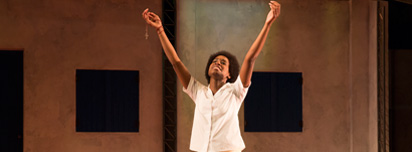Last Friday evening, almost on a whim, I went with a friend to see a play that was entering its final weekend. I was intrigued when I heard ‘Our Lady of Kibeho’ was written by Katori Hall, a young playwright whose ‘The Mountaintop’ several years earlier on Broadway had garnered awards and lots of attention. That play featured Samuel L Jackson as Martin Luther King, Jr and Angela Bassett as a maid whom Dr. King had an extended conversation with on what turned out to be his final night alive. While the performances were strong, the show included some supernatural elements at its conclusion which I found ruined what had come before. Still, I was curious about ‘Our Lady’ which was highly recommended by arts reviewers on my local radio station and which, I thought, might lend itself more readily to the supernatural. I was not disappointed.
Set in Rwanda, ‘Our Lady’ is based on a true story of 3 girls at a Catholic high school in the 1980s who claim visitations by the Virgin Mary. These sightings occur repeatedly over a period of years and among the things she tells and shows them is a warning of the violence that is to befall this nation 10 years later. I was unfamiliar with this story which took place in the village of Kibeho (“chi be ho”), despite my keen interest in Rwanda and the subsequent ways forgiveness and reconciliation have been woven into the fabric of that nation following the tragic genocide of almost 1 million people over just 3 months in April of 1994. Reports of visitations from Mary had occurred in several places in Europe but it was the first time this occurred in Africa which contributed to both local and international skepticism as to whether it was really true. In fact in the play, an envoy from the Vatican is sent to verify whether the girls’ accounts of seeing and hearing from Mary are credible. We as the audience observe some of girls’ experiences and are invited to decide this for ourselves. Is Mary really communicating with and through them or are the girls making the whole thing up to garner attention?
From the minute I walked into the 300 person space, one of three that is part of the Signature Theatre on 42nd Street, I felt as I was back in East Africa again. The set resembled many secondary schools I’ve seen in Uganda, banana trees framed the stage, and the horizon offered a view of lush rolling hills. Rwanda is known as “the land of a thousand hills”. Recall that the hotel featured in the movie ‘Hotel Rwanda’ was called Mille Collines – 1,000 hills. Turns out Rwanda is so spectacularly beautiful that Rwandans like to joke that its where God goes on vacation. The priest sent by the Vatican at one point in the play counters that, God may vacation in Rwanda, but he lives in Rome.
The two main characters were Africans and as a result, they were extremely convincing (which doesn’t often happen when African-American actors try to play Africans. They often struggle with the accent which is an immediate give-away.) A Kenyan actor, Owiso Odera, played a Rwandan priest, the head of the school, who struggles to come to terms with whether to believe these events. The main actress, Nneka Okafor, who played the first schoolgirl to experience the visitations, was Nigerian-American. She was outstanding. Her powerful performance conveyed an unusual combination of innocence, humility and courage. It was out her mouth that the words “truth is not afraid of the machete” were spoken.
Sadly the play’s two month run ended on Sunday. This was the play’s debut but it’s sure to appear somewhere else in the next year or two – and I wouldn’t be surprised if it becomes a film one day. Hall, the playwright, disclosed in an interview that she was looking for a fresh way to write about the genocide, to better understand for herself what led to those terrible events. She learned about the visitations during a trip to Rwanda in 2009 when she visited the shrine now built to Our Lady in Kibeho. Focusing on three poor, Rwandan girls in a small village in the most Christian of African countries, Hall has succeeded in giving us new ways to understand the complex intertwining of ethnic tensions, Catholicism, political power, and colonialism – Rwanda was under Belgian rule – on the psyche of a nation.
Photo: Nneka Okafor by Joan Marcus, courtesy of Signature Theatre.
